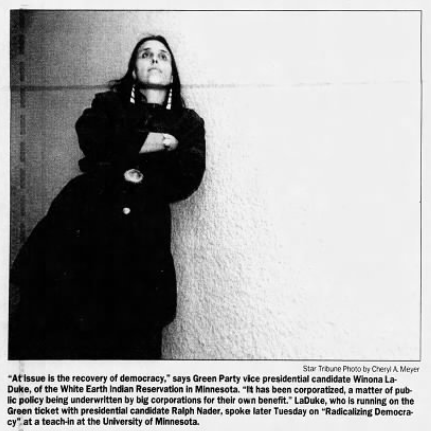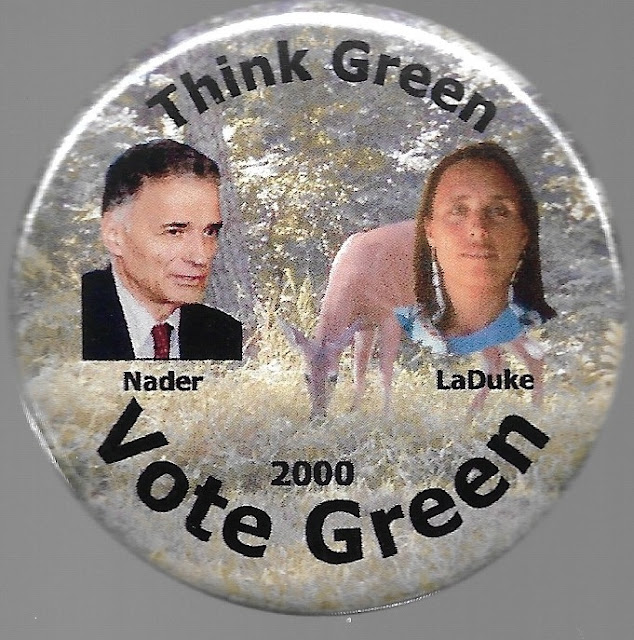Showing posts with label Winona LaDuke. Show all posts
Showing posts with label Winona LaDuke. Show all posts
Wednesday, June 3, 2020
Winona LaDuke
Winona LaDuke, August 18, 1959 (Los Angeles, Calif.) -
VP candidate for Green Party (aka Liberty Ecology Community Party aka Pacific Party aka Independent) (1996)
VP candidate for Green Party (aka DC Statehood Green Party aka Pacific Green Party aka United Citizens Party aka Progressive/Green Party aka Independent aka Association of State Green Parties) (2000)
Running mate with nominee (1996, 2000): Ralph Nader (b. 1934)
Popular vote (1996): 555,604 (0.58%)
Popular vote (2000): 2,883,443 (2.74%)
Electoral vote (1996, 2000): 0/538
The campaign (1996):
Using the term "Green Party" as a national political entity applied to the situation in 1996 is a bit misleading. Rather than a centralized and unified juggernaut, Ralph Nader's Presidential run in this year was not really nationally managed or coordinated in the traditional way. The Green Party of this era consisted of a confederation of local groups, some of them actually in serious conflict with each other including two groups that were in contention for the official "Green Party" mantle.
Drafted by several groups, Ralph Nader did not swear to fight for the platform of any specific party and declared himself an independent. But he still showed up on most ballots next to a party name, usually with the word "Green" in it.
He told a Green convention that endorsed him in California in Aug. 1996:
Many Americans who call themselves liberals have so lowered their expectations about what politics can mean to this nation's future that they are settling for diminishing returns. Politics has been corrupted not just by money but by being trivialized out of addressing the great, enduring issues of who controls, who decides, who owns, who pays, who has a voice and access, and why solutions available on the shelf are not applied to the existing and looming crises of our society, both local and global.
One thing politicians do understand is rejection. When voters are deciding how they wish to use their vote, they should ask themselves how best to send a clear message. The Greens and other progressives are in the early building stages of a people-first, democratic political movement for future years. They deserve our attention because they are centering on the basic issues of representative government, one of whose purposes is to strengthen the usable tools of democracy, the other, in Thomas Jefferson's prophetic words, is "to curb the excesses of the monied interests."
Although not quite as confusing as attempting to identify Eugene McCarthy's running-mates in 1976, nailing down Nader's VP in 1996 isn't easy. His own selection was Winona LaDuke and she is generally recognized as the official person in that role. But there were stand-ins as well, such as Anne E.R. Goeke on the ballot in Iowa and Vermont, Madelyn R. Hoffman in New Jersey, and Muriel Tillinghast in New York. In Florida, where Nader was a write-in, Islara Boixados Souto was considered the running-mate.
Richard Walton (1984 Citizens Party VP) was a stand-in in Rhode Island until replaced by LaDuke. Some sources claim other stand-ins were Krista Paradise in Colorado, Bill Boteler in DC, and Deborah Howes in Oregon but I have not found any primary documents confirming those names as VPs on the ballot. In a few other states Nader did not have a running-mate.
LaDuke, a noted environmental and indigenous activist based in Minnesota's White Earth Reservation in 1996, was on the ballot with Nader in 18 states and considered his write-in VP in a few more. Her acceptance speech after being drafted by Nader was bilingual (Ojibwe/English) and she thanked the stand-in VPs, both factoids probably being a first in the third party running-mate record books. Through her father she has some heritage from the Mississippi Band of Anishinaabe Indians.
In terms of election results, Ross Perot's entry in the contest muddies the waters a bit, but Nader still had an impressive 4th place finish with 685,435 popular votes (0.71%). He cracked over 1% in 16 states + DC. The Nader/LaDuke ticket had their top ten results were Oregon 3.59%, Alaska 3.14%, Hawaii 2.88%, Washington 2.68%, District of Columbia (where they made 3rd place) 2.57%, Maine 2.52%, New Mexico 2.38%, California 2.37%, Connecticut 1.75%, Colorado 1.66%. A bit amazing considering Nader eschewed corporate campaign donations and exhibited some slight hesitancy in his electioneering. The earlier comparison with Eugene McCarthy seems appropriate in that both candidates communicated intellect that almost totally overshadowed passion.
The campaign (2000):
Between 1996 and 2000 the Greens began to slowly build a national party under the auspices of the Association of State Green Parties. I use the term "Greens" generically since the older Greens/Green Party USA preferred to go in a different direction.
The ASGP nominated Nader and LaDuke for a second run, but this time their effort came closer to resembling a traditional campaign, posing more of a threat to the outcome of the election.
The issue that demonstrated an interesting split with the Greens concerned the Makah Indians and whaling. Located in the NW tip of the Olympic Peninsula in Washington State, the Makah were the only indigenous nation to be guaranteed whaling rights when they signed a treaty with the American government. That was in 1855. In the 1990s, after local whales were removed from the Endangered Species List, the Makah resumed whale hunting after a 70+ year hiatus. In the divisive animal protection vs. Native American treaty rights issue among the progressives, Nader and LaDuke sided with the latter although they generally supported a moratorium on commercial whaling in general.
The 2000 ticket also had the backing and shared the ballot with the DC Statehood Party, Pacific Party (Ore.), Vermont Progressive Party, and the United Citizens Party (SC).
Full disclosure. Although I voted for Clinton/Gore in 1996 I cast my ballot for Nader/LaDuke in 2000. One of my cousins in Alaska offered to trade votes. She promised to vote for Nader in a red state if I voted for Gore in what she thought was a swing state. Those kinds of deals were apparently quite frequent in 2000. I did not take her up on the offer.
Al Gore took Washington State which was not a big surprise. A bit later I was present when the Electors cast their votes for Gore in the Legislative Building in Olympia. Not long after that an earthquake measuring almost 7.0 hit Oly and that room was wrecked when giant shards of skylight glass impaled the furniture. I like to think that is a metaphor for something, but not sure what!
The popular belief is that Nader's strong showing was a spoiler and handed the election to Bush. But several political scientists dispute that claim and the controversy continues to this day. For his part, Ralph Nader was exiled from national politics and held at arm's length by once friendly establishment progressives.
On the ballot or registered write-in in all but three states, the ticket finished just short of 3% and 3 million votes, placing third. Nader/LaDuke's top ten were: Alaska 10.07%, Vermont 6.92%, Massachusetts 6.42%, Rhode Island 6.12%, Montana 5.95%, Hawaii 5.88%, Maine 5.70%, Colorado 5.25%, District of Columbia 5.24%, and Minnesota 5.20%.
In this election Winona LaDuke received more popular votes than any other female third party VP candidate in US history.
Election history:
2016 - White Earth Tribal Chair - defeated
Other occupations: executive director of Honor the Earth, industrial hemp grower, high school principal, lecturer, author, novelist, economist
Notes:
PNW trivia alert! Raised in Ashland, Ore.
Endorsed Kerry in 2004, Obama in 2008, 2012.
Washington State trivia alert!!! Bob Satiacum, a well known figure in my neck of the woods, was a
Democratic faithless Elector in 2016 and cast his vote for Faith Spotted Eagle with LaDuke as the
VP. Sort of funny a Faith-less Elector voted for someone named "Faith"
More WA trivia!!! LaDuke was the speaker for the The Evergreen State College graduating class of
2014.
Friday, February 7, 2020
Richard John Walton
Richard John Walton, May 24, 1928 (Saratoga Springs, NY) – December 27, 2012 (Providence, RI)
VP candidate for Citizens Party (aka Independent aka Citizens Group) (1984)
Running mate with nominee: Sonia Johnson (b. 1936)
Popular vote: 24,236 (0.03%)
Electoral vote: 0/538
The campaign:
In their second, and final, national election the Citizens Party selected Sonia Johnson as the standard bearer. Johnson had an inner conflict to reconcile-- she was a devout Mormon but also passionate about the passage of the Equal Rights Amendment. Naturally as her ERA activism increased and she became critical of the Church she found herself excommunicated. To some she was a heretic, to others a heroine.
Barry Commoner, the 1980 Presidential nominee, endorsed Rev. Jesse Jackson in the 1984 Democratic primaries, a move that many felt took the wind out of the sails of this new third party. Another major hurdle for the 1984 campaign was that the Party was still paying off the debt from the 1980 effort.
There were three running-mates for Johnson in 1984. Richard Walton was the official VP nominee on the ballot or certified write-in in 21 states. In California Johnson had won the primary for the Peace and Freedom Party (which included defeating Dennis Serrette of the New Alliance Party and Gavrielle Holmes of the Workers World Party) and her running-mate there was Emma Wong Mar. In Pennsylvania under the banner of the Consumer Party her VP was Bill Thorn.
In addition to the Peace and Freedom Party and the Consumer Party there was another major player. The Socialist Party of the United States of America decided not run a ticket in 1984 and endorsed the Citizens Party.
Although the Citizens Party had a generally progressive platform and was comprised of the largest confederation of Leftist parties in 1984, Johnson's campaign understandably made feminist issues the central focus. Like many other third party efforts, the Johnson/Walton ticket made more news about legal challenges concerning inclusion in the debates and ballot placement than they did in promoting their issues.
The popular vote was almost evenly split three ways among the VPs. Nationally the Party grossed 72,161 votes (0.08%), a considerable decline from their 1980 performance. Interesting that 2/3 of the result came from California and Pennsylvania where they ran under the names of their host parties. The ticket with Walton did contain their highest percentage, 0.56% in Louisiana, where they actually placed third. Johnson/Walton's next highest percentages came from Utah 0.13%, North Dakota 0.12%, Arkansas and Vermont 0.11% each, and Washington 0.10%.
The Citizens Party evaporated shortly after the election. Or did it? In hindsight we see they served as a forerunner of today's Green Party, America's 4th largest political party. Walton himself become one of those who was part of forming the Green Party.
Election history: none
Other occupations: US Navy, disc jockey, journalist, author, teacher, union activist, activist for the homeless
Buried: ?
Notes:
Worked for Adlai Stevenson 1952 and 1956, and for George McGovern 1972.
Later joined the Green Party and was a 1996 Rhode Island temporary stand-in for VP nominee
Winona LaDuke.
Subscribe to:
Comments (Atom)




















